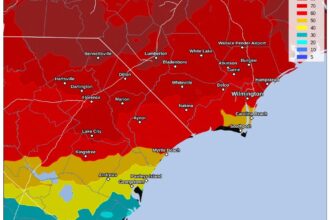County commissioners approved a controversial new tax billing fee for urban taxpayers Monday, with a provision that officials from both the county and municipalities can negotiate a lower rate.
In February, commissioners approved a resolution proposed by County Manager Eddie Madden to charge other local governments a fee of four percent for each parcel billed on property taxes, as opposed to the flat $3 fee that has been in place since 2010. Cities and towns are not required to contract with the county for property tax collections, but many do to simplify the process for taxpayers and citizens. The extra fee will only be applied to taxable parcels in towns and cities, not rural residents.
Whiteville City Manager Darren Currie and Tabor City Town Manager Josh Ford spoke during the public comment section of the meeting. Both criticized the move.
Currie noted that the city and county have an agreement where either party can withdraw from the current agreement, with 120 days notice. Board attorney Amanda Prince reminded commissioners that the agreement would be met if the new proposal was passed and given a deadline of July 1.
Currie said despite repeated requests to speak with Madden about the proposal, he received no response. The city clerk and mayor received a letter April 17, he said, but Currie never got a response to his emails.
“We are willing to negotiate a reasonable fee,” he said. “Does the county just want out of the tax collection business?”
Under the new agreement, the current expense to the city of $12,000 would increase to $120,000. Mailing a single notice at $3.56 would increase to $35.52, a cost that would have to be passed on to taxpayers, either in a fee increase, more taxes or reducing services.
Currie was cut off after three minutes, as is county policy during the public comments segment, but was questioned by commissioners after he returned to the audience.
Ford told the board that he felt the public comments period was “the last place” for leaders to discuss policy changes, “but this is the only avenue we have available right now.” He said the drastic increase would have a serious negative effect on both individual and business taxpayers in Tabor City. At least one commercial taxpayer would see their collection fee go from $3 to $360, he said.
“The taxpayers are going to have to simply take it from one pocket to put in another,:” he said.
Commissioner Giles Byrd asked Currie and Long about the county’s two percent early pay discount.
“We haven’t been withholding that,” he said. He also asked about how past due taxes were collected. The county tax office handles collections for overdue taxes as well as current taxes, for a fee of eight percent of the total value.
Whiteville Mayor Terry Mann was blunt in his assessment of the plan.
“As a businessman, I know everything costs more,” he said. “I understand having to pay your people more. But to go form a flat fee to a percentage – that’s just crazy.”
Mann noted that the city’s largest property tax payer, Walmart, has a value of $1.3 million, and pays around $52,000 in property taxes annually. A private citizen owning a $20,000 lot who has to pay the percentage based fee would feel it much worse, he said.
Most taxpayers mail their payments while some bring them to the tax office, Mann said. He asked the commissioners why the county suddenly needed the additional revenue, when very little has changed.
“Most folks are going in there once,” he said. “If they go twice, it’s because they didn’t bring enough money wit them. How much extra work is that for the staff? I don’t understand.”
He also criticized the county administration for making the new plan retroactive to Jan. 1, to meet the requirements of the agreement.
“How can you go back and say that this was in place before?” he said. Mann noted that if the city pulled out of the county agreement, he was not sure the city could revamp its system in time to begin collecting taxes for next year.
“I don’t think 120 days was enough time to start with,” he said. “I’m not sure this is even feasible for the city of Whiteville. I don’t know how the smaller towns are going to deal with it.”
Commissioner Scott Floyd made a motion tot able the measure, with a second by Barbara Featherston, but withdrew the motion in favor of a replacement measure proposed by Brent Watts. Floyd gave a second to Watts new motion to pass the percentage based fee schedule, but to set up a meeting to negotiate rates in the near future. That measure passed unanimously.






